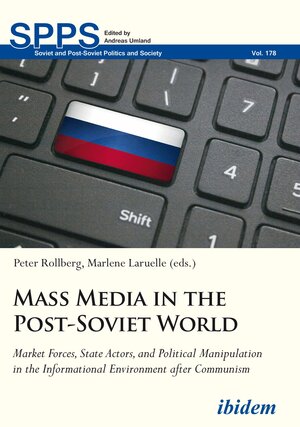
×
![Buchcover ISBN 9783838211169]()
“Mass Media in the Post-Soviet World is a truly remarkable new collection of essays addressing one of the most important questions in the post-Communist space―the role of mass media. With contributions from some of the foremost experts, the essays offer a deep and subtle analysis of problems and opportunities in the media sphere. Moreover, while the essays recognize the important role of Russian media in general and television in particular, they range much more broadly across the Soviet space providing invaluable insight from around the region and from different media platforms. This is an exceptional collection that will be invaluable to anyone wanting to understand the politics and role of media in post-Soviet societies.”—Graeme Robertson, Professor of Political Science, University of North Carolina at Chapel Hill
„This book provides the best available analysis of the complexity of media ecologies in post-Soviet societies. Taking their analysis beyond the critique of the democratic deficit, contributors offer new insights into how a range of domestic and global factors converge to create new media models which combine governmental control with catering to diverse audiences.“—Vera Tolz, Sir William Mather Professor of Russian Studies, the University of Manchester, author of Nation, Ethnicity and Race on Russian Television (Routledge, 2015)
„This edited volume is an interesting collection of compelling case studies and comparative analyses that offer a variety of interdisciplinary thoughts on how to understand the role of mass media in the post-Soviet world.“—Europe-Asia Studies 71:5 (2019)
Mass Media in the Post-Soviet World
Market Forces, State Actors, and Political Manipulation in the Informational Environment after Communism
von Marlene Laruelle und Peter RollbergThis collection covers the major trends of the media environment of the post-Communist world and their recent development, with special focus on Russia and the post-Soviet space. The term ‘media environment’ covers not just traditional print and electronic media, but new media as well, and ranges from the political to entertainment and various artistic spheres. What role do market forces play in the process of media democratization, and how do state structures regulate, suppress, or use capitalism toward their own gain? What degree of informational pluralism has been achieved in the newly independent republics? What are the prospects for transparency and the participation of civil society in Russian and Eurasian media? To what degree do trends in post-Communist media reflect global trends? Is there a worldwide convergence with regard to both media formats and political messaging? Western observers usually pay their keenest attention to the role of media in Russia and Eurasia during national elections. While this is a valid focus, the present volume, with contributions by Luca Anceschi, Jonathan Becker, Lee B. Becker, Michael Cecire, Marta Dyczok, Nicola Ying Fry, Navbahor Imamova, Azamat Junisbai, Barbara Junisbai, Kornely Kakachia, Maria Lipman, Oleg Manaev, Marintha Miles, Olena Nikolayenko, Sarah Oates, Tamara Pataraia, Elisabeth Schimpfossl, Abdulfattoh Shafiev, Jack Snyder, Tudor Vlad, and Ilya Yablokov, aims at understanding the deeper overall ‘media philosophies’ that characterize post-Soviet media systems and environments, and the type of identity formation that they are promoting.


